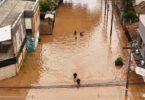LONDON/DOVER (Reuters): Britain’s first scheduled flight taking asylum seekers to Rwanda was set to depart on Tuesday, with the government warning that anyone who avoided it through last-minute legal challenges would be put on a later plane despite an outcry from critics.
With just hours to go before the flight was due to depart from London, lawyers for human rights groups and campaigners took their case to the Supreme Court, only for the judge to reject it.
However, several individuals have successfully argued that they should not be deported to Rwanda on health or human rights grounds, meaning the numbers due to depart have dwindled from an original 37 to just 7. Other legal challenges were ongoing.
Britain has struck a 120-million-pound ($148 million) deal with Rwanda to send some migrants, who had arrived illegally by crossing the Channel in small boats from Europe, to live in the landlocked African country.
The plan has horrified political opponents, charities and religious leaders who say it is inhumane. The United Nations’ refugee chief called it “catastrophic,” the entire leadership of the Church of England denounced it as immoral and shameful and media reports have said Prince Charles has privately described the plan as “appalling.”
The government says the deportation strategy is needed to stem the flow of migrants risking their lives in Channel crossings and smash people-smuggling networks.
Judges in several courts have said there was a public interest in the Home Office being able to pursue the policy.
Prime Minister Boris Johnson said the legal bids were undermining the government’s attempts to support safe and legal routes to come to Britain.
“We are not going to be in any way deterred or abashed by some of the criticism that has been directed upon this policy, some of it from slightly unexpected quarters, we are going to get on and deliver,” he told his cabinet ministers.
NEXT FLIGHT
According to government figures, more than 28,500 people were detected arriving in Britain on small boats last year. Dozens more, including women and young children, arrived on Tuesday, a Reuters witness in the Channel port of Dover said.
More than 130 people have been given deportation notices, with 37 originally scheduled to be removed on Tuesday. Charities have said this included people fleeing Afghanistan and Syria as well as Iran and Iraq.
In one legal case on Tuesday a lawyer argued that his client, an Iranian national, had mental health problems and would be at risk of committing suicide if deported to Rwanda. A lawyer for the government said this claim was not supported by a doctor who had assessed him. The judge rejected his appeal.
“There will be people on this flight and if they’re not on this flight, they will be on the next flight because we are determined to break the model of the appalling people traffickers,” Foreign Secretary Liz Truss told Sky News. “The really important thing is that we establish the principle.”
Human rights groups say the policy will put migrants at risk. The UNHCR has said Rwanda, whose own human rights record is under scrutiny, does not have the capacity to process the claims, and there is a risk some migrants could be returned to countries from which they had fled.
A full hearing to determine the legality of the policy as a whole is due in July.






